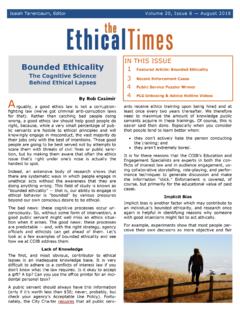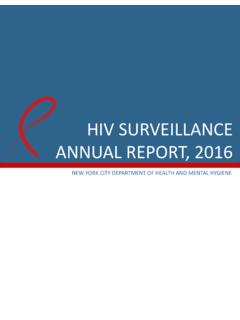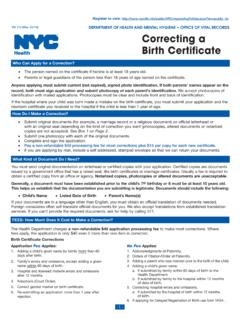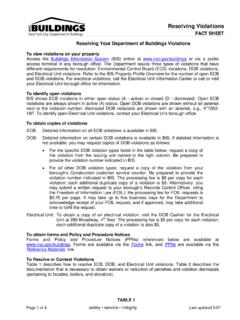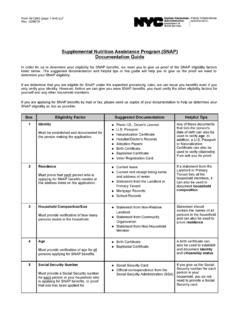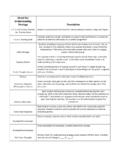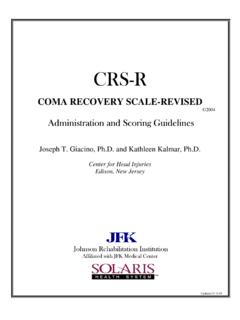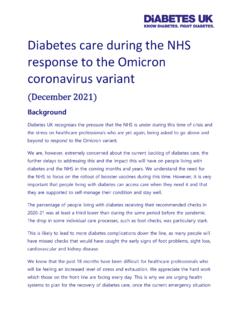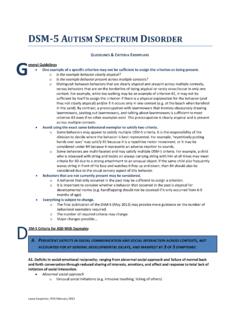Transcription of COVID-19 Testing: Frequently Asked Questions (FAQ)
1 COVID-19 Testing: Frequently Asked Questions (FAQ) There are two main types of COVID-19 tests: Diagnostic (virus) tests: use respiratory specimens (nose swab or saliva specimens) to identify whether someone has COVID-19 now. Antibody tests (also called serology tests): blood tests used to identify whether someone had COVID-19 at some point in the past. To find a testing site, visit Many sites offer testing at no cost and regardless of immigration status. Diagnostic Tests for Current Infection How is diagnostic testing done? Diagnostic testing involves collecting a specimen by inserting a swab (similar to a long Q-tip) into your nose or throat or by collecting saliva.
2 The test may be performed on site or the specimen may be sent to a laboratory. If you have symptoms of COVID-19 , you should isolate at home while waiting for your test results. Who should get a COVID-19 diagnostic test? Everyone should get tested for COVID-19 right away if they have COVID-19 symptoms, and five days after being exposed to someone with COVID-19 . It is also a good idea to get tested before and after travel or attending a large gathering. People who are not fully vaccinated against COVID-19 should also consider periodic testing if they have frequent in-person interactions with others at work or socially. People who had COVID-19 in the past three months (positive diagnostic test) and recovered do not need to be tested unless they have COVID-19 symptoms.
3 There may be different testing requirements in certain settings, such as schools and group living facilities. For more information on frequency of testing, visit , select Testing on the left and see COVID-19 Testing: How Often to Get Tested. What are the different types of COVID-19 diagnostic tests? There are two types of COVID-19 diagnostic tests: Molecular tests (often called PCR or Nucleic Acid Amplification tests) These tests detect genetic material of the virus that causes COVID-19 . Molecular tests generally require the specimen to be sent to a laboratory, which is why it usually takes a few days to receive results. COVID-19 molecular tests are very accurate, as they can detect the virus even if there is only a small amount in your system.
4 1 Antigen tests (often called point-of-care (POC) or rapid tests) These tests detect certain proteins in the virus that causes COVID-19 . Antigen tests usually are processed in a health care provider s office, rather than a laboratory. For this reason, results are usually ready quickly (in under an hour). However, COVID-19 antigen tests are generally not as accurate as molecular tests. There are both false positive test results (the test result is positive even though the person doesn t have COVID-19 ) and false negative test results (the test result is negative even though the person has COVID-19 ).
5 For this reason, it is recommended that health care providers perform a follow-up molecular test to confirm the test results in certain circumstances, s uch as when a person has symptoms of COVID-19 , but the antigen test is negative. What is at-home testing and when should I use at-home tests? COVID-19 at-home diagnostic testing (also called self-testing) allows some or all parts of the testing process to take place at home. With some at-home tests, you collect a nasal or saliva sample and send it to a laboratory. Other tests allow you to test the sample yourself, with results available in minutes. If you need to be tested for COVID-19 and cannot be tested by a health care provider, consider at-home testing.
6 Note: At- home test results may not be accepted for some purposes, such as school, employer or travel testing requirements. At-home testing may be less accurate than tests performed by a health care provider, so you may need to follow up with your provider and arrange for another COVID-19 test to confirm your at-home test result. For more information on at-home testing, including tips for performing at-home tests and how to interpret the results, visit What type of testing is performed at the NYC Health Department s covid Express sites? covid Express uses a PCR molecular test. We have laboratories with automated testing machines on site, which allow patients to receive results in 24 hours or less.
7 To learn more and make an appointment, visit the COVID-19 Express webpage at How do I know what kind of COVID-19 diagnostic test to get? Your health care provider can help decide which type of test is best for you based on the reason for your testing, such as a recent exposure, presence of symptoms or periodic testing. If you get an antigen test, your provider may recommend a molecular test to confirm your test result, depending on your reason for testing. When making decisions based on test results, always consider the type of test you received. For example, if you live with or plan to visit someone at increased risk for severe COVID-19 , keep in mind that molecular tests are more accurate. What does a positive diagnostic test result mean?
8 A positive test result means that you most likely have COVID-19 and must stay home (isolate) and take precautions to reduce the risk of spreading the virus to others. Information about what to do when sick, how to protect others and when you can leave home is available at If you are unable to separate from others at home, you may be 2 eligible for a free hotel room. For more information, visit What does a negative diagnostic test result mean? A negative test result means that you most likely do not have COVID-19 . If you have symptoms, continue taking precautions like wearing a face mask, because it is possible you have the virus but the test did not detect it.
9 If I have been vaccinated against COVID-19 , will I test positive for COVID-19 ? The vaccines cannot give you covid -1 9 or make you test positive for COVID-19 . The vaccines do not contain the virus that causes COVID-19 . If you test positive for COVID-19 , that means you likely have COVID-19 due to a recent exposure. Antibody Tests for Past Infection What are antibodies? Antibodies are special proteins that the body produces to help fight off infections. They can be produced even if a person has few or no symptoms. Sometimes antibodies protect us from getting the same infection again, and this is likely also true for COVID-19 . What is the purpose of COVID-19 antibody testing? Antibody testing can help us better understand COVID-19 , including how the body responds to the virus.
10 It can also help us estimate how many people have had COVID-19 . Antibody tests are not recommended for the purpose of deciding whether to get vaccinated. Who can get an antibody test? Antibodies take time to develop when someone is sick, so antibody testing will not be accurate for someone who is or was recently sick. Antibody testing should not be performed on someone who has COVID-19 symptoms, had COVID-19 symptoms within the last two weeks or had a positive diagnostic test for COVID-19 within the past two weeks (based on the date the sample was taken). How is antibody testing done? Antibody testing requires getting a blood sample through a finger stick or drawing blood from a vein in your arm.
